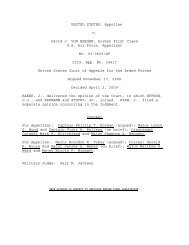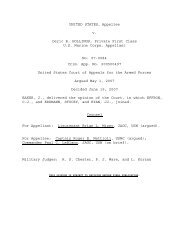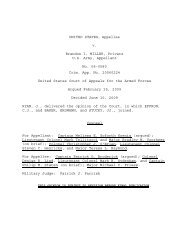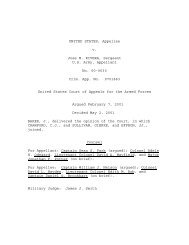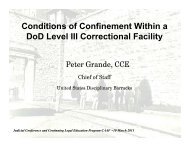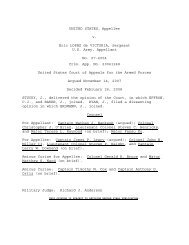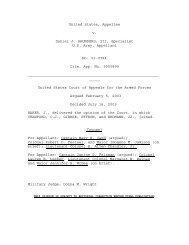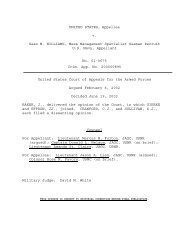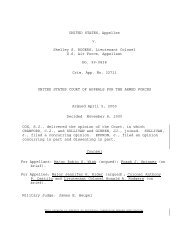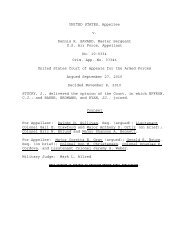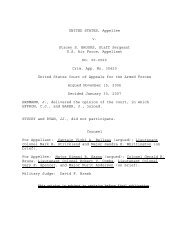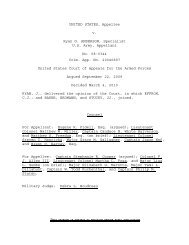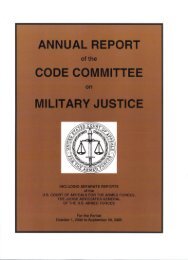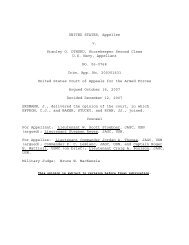United States v. Wilson - U.S. Court of Appeals for the Armed Forces
United States v. Wilson - U.S. Court of Appeals for the Armed Forces
United States v. Wilson - U.S. Court of Appeals for the Armed Forces
Create successful ePaper yourself
Turn your PDF publications into a flip-book with our unique Google optimized e-Paper software.
UNITED STATES, Appellee<br />
v.<br />
James D. WILSON, Staff Sergeant<br />
U.S. Army, Appellant<br />
No. 09-0010<br />
Crim. App. No. 20061187<br />
<strong>United</strong> <strong>States</strong> <strong>Court</strong> <strong>of</strong> <strong>Appeals</strong> <strong>for</strong> <strong>the</strong> <strong>Armed</strong> <strong>Forces</strong><br />
Argued April 27, 2009<br />
Decided June 18, 2009<br />
EFFRON, C.J., delivered <strong>the</strong> opinion <strong>of</strong> <strong>the</strong> <strong>Court</strong>, in which<br />
BAKER, ERDMANN, and RYAN, JJ., joined. STUCKY, J., filed a<br />
dissenting opinion.<br />
Counsel<br />
For Appellant: Captain Pamela Perillo (argued); Lieutenant<br />
Colonel Mark Tellitocci, Lieutenant Colonel Mat<strong>the</strong>w M. Miller,<br />
and Major Grace M. Gallagher (on brief).<br />
For Appellee: Captain Sarah J. Rykowski (argued); Colonel<br />
Denise R. Lind, Lieutenant Colonel Mark H. Sydenham, and Captain<br />
Philip M. Staten (on brief).<br />
Military Judge: Donna M. Wright<br />
THIS OPINION IS SUBJECT TO REVISION BEFORE FINAL PUBLICATION.
<strong>United</strong> <strong>States</strong> v. <strong>Wilson</strong>, No. 09-0010/AR<br />
Chief Judge EFFRON delivered <strong>the</strong> opinion <strong>of</strong> <strong>the</strong> <strong>Court</strong>.<br />
The charges referred to Appellant’s general court-martial<br />
alleged a variety <strong>of</strong> <strong>of</strong>fenses concerning abuse <strong>of</strong> his<br />
stepdaughter, RC. The charged <strong>of</strong>fenses included making a false<br />
<strong>of</strong>ficial statement, rape <strong>of</strong> a child (two specifications), sodomy<br />
with a child, and indecent act with a child (two<br />
specifications), in violation <strong>of</strong> Articles 107, 120, 125, and 134<br />
<strong>of</strong> <strong>the</strong> Uni<strong>for</strong>m Code <strong>of</strong> Military Justice (UCMJ), 10 U.S.C. §§<br />
907, 920, 925, 934 (2000). The military judge dismissed <strong>the</strong><br />
sodomy and indecent acts charges based upon <strong>the</strong> statute <strong>of</strong><br />
limitations. The prosecution elected to not present evidence on<br />
one <strong>of</strong> <strong>the</strong> rape specifications, leading to a finding <strong>of</strong> not<br />
guilty on that specification. The military judge, sitting as a<br />
general court-martial, convicted Appellant, contrary to his<br />
pleas, <strong>of</strong> making a false <strong>of</strong>ficial statement and <strong>of</strong> <strong>the</strong> remaining<br />
rape specification.<br />
The military judge sentenced Appellant to reduction to pay<br />
grade E-1, confinement <strong>for</strong> eleven years, and a dishonorable<br />
discharge. The convening authority approved <strong>the</strong> adjudged<br />
sentence and waived <strong>the</strong> automatic <strong>for</strong>feitures <strong>for</strong> six months.<br />
The present appeal concerns <strong>the</strong> rape conviction. The<br />
<strong>of</strong>fense, as charged, read as follows:<br />
In that [Appellant], did, at or near Colorado Springs,<br />
Colorado, on divers occasions between on or about 15<br />
February 1996 and on or about 1 March 1998, rape [RC], a<br />
2
<strong>United</strong> <strong>States</strong> v. <strong>Wilson</strong>, No. 09-0010/AR<br />
person under <strong>the</strong> age <strong>of</strong> 12.<br />
The military judge concluded that <strong>the</strong> <strong>of</strong>fense consisted <strong>of</strong> a<br />
single incident, and struck out <strong>the</strong> phrase “on divers occasions”<br />
from <strong>the</strong> findings. In so doing, <strong>the</strong> military judge convicted<br />
Appellant <strong>of</strong> a single rape, while acquitting Appellant <strong>of</strong><br />
multiple incidents <strong>of</strong> rape.<br />
The <strong>United</strong> <strong>States</strong> Army <strong>Court</strong> <strong>of</strong> Criminal <strong>Appeals</strong> affirmed.<br />
<strong>United</strong> <strong>States</strong> v. <strong>Wilson</strong>, No. ARMY 20061187 (A. Ct. Crim. App.<br />
Aug. 27, 2008) (unpublished). On Appellant’s petition, we<br />
granted review <strong>of</strong> <strong>the</strong> following issue:<br />
WHETHER THE ARMY COURT OF CRIMINAL APPEALS ERRED<br />
IN AFFIRMING APPELLANT’S CONVICTION FOR RAPE WHEN<br />
THE MILITARY JUDGE EXCEPTED “ON DIVERS OCCASIONS”<br />
FROM THE SPECIFICATION AND DID NOT SPECIFY THE<br />
SINGLE OCCASION AS PART OF THE FINDING, BUT THE<br />
VICTIM ONLY TESTIFIED TO A SINGLE OCCURRENCE AND<br />
THE PARTIES ONLY ARGUED THIS SINGLE OCCASION TO<br />
THE MILITARY JUDGE.<br />
For <strong>the</strong> reasons set <strong>for</strong>th below, we conclude that <strong>the</strong> military<br />
judge erred under <strong>the</strong> circumstances <strong>of</strong> this case by not<br />
identifying <strong>the</strong> single occasion that <strong>for</strong>med <strong>the</strong> basis <strong>for</strong> <strong>the</strong><br />
conviction.<br />
3
<strong>United</strong> <strong>States</strong> v. <strong>Wilson</strong>, No. 09-0010/AR<br />
I. BACKGROUND<br />
A. THE CHARGE: MULTIPLE INCIDENTS OF RAPE<br />
OVER AN EXTENDED PERIOD OF TIME<br />
The convening authority had a number <strong>of</strong> options with<br />
respect to <strong>the</strong> <strong>of</strong>fense at issue, including referring a single<br />
specification alleging a single incident <strong>of</strong> rape; referring<br />
multiple specifications alleging different incidents <strong>of</strong> rape; or<br />
referring a single specification alleging multiple incidents <strong>of</strong><br />
rape. In choosing <strong>the</strong> last option, a single specification<br />
covering multiple incidents, <strong>the</strong> convening authority referred<br />
<strong>for</strong> trial an allegation that <strong>the</strong> rapes occurred “on divers<br />
occasions” over a lengthy period <strong>of</strong> time -- “between on or about<br />
15 February 1996 and on or about 1 March 1998.”<br />
B. THE PROSECUTION’S OPENING STATEMENT<br />
Trial counsel made a very brief opening statement in which<br />
he underscored <strong>the</strong> prosecution’s primary reliance on two sources<br />
<strong>of</strong> evidence about alleged acts. First, he referred to <strong>the</strong><br />
anticipated testimony from <strong>the</strong> victim, RC, and her difficulty in<br />
recalling specific dates. He noted that RC would describe a<br />
specific incident <strong>of</strong> rape on Appellant’s bed and “o<strong>the</strong>r<br />
incidents.” Second, trial counsel stated that <strong>the</strong> prosecution<br />
would present evidence “about <strong>the</strong>se acts from <strong>the</strong> mouth <strong>of</strong> <strong>the</strong><br />
accused through” statements he provided to law en<strong>for</strong>cement<br />
<strong>of</strong>ficials. According to trial counsel, Appellant’s pretrial<br />
4
<strong>United</strong> <strong>States</strong> v. <strong>Wilson</strong>, No. 09-0010/AR<br />
statements would “clarify <strong>the</strong> critical details <strong>of</strong> [RC’s]<br />
recollection <strong>of</strong> those events.”<br />
C. EVIDENCE OF THE INCIDENTS FROM THE TESTIMONY OF THE VICTIM<br />
AND FROM APPELLANT’S PRETRIAL ADMISSIONS<br />
1. Testimony <strong>of</strong> <strong>the</strong> victim<br />
RC testified at <strong>the</strong> court-martial regarding <strong>the</strong> incidents<br />
she could remember. These incidents occurred approximately ten<br />
years be<strong>for</strong>e <strong>the</strong> court-martial, when RC was five to seven years<br />
old. When asked if she understood at <strong>the</strong> time what had occurred<br />
during <strong>the</strong> incidents, she said: “I didn’t know what was<br />
happening. I knew that it was what he told me to do and that I<br />
didn’t like it at all.”<br />
RC described one incident in which Appellant “did penetrate<br />
me” in a bedroom <strong>of</strong> <strong>the</strong>ir Colorado Springs home. RC recounted a<br />
number <strong>of</strong> details including <strong>the</strong> following: Appellant placed her<br />
in a bent position and approached her from behind; <strong>the</strong> act took<br />
place on <strong>the</strong> floor; <strong>the</strong> penetration was painful; she asked <strong>for</strong><br />
her teddy bear <strong>for</strong> com<strong>for</strong>t during <strong>the</strong> act but Appellant refused<br />
to give it to her; and that, following <strong>the</strong> act, Appellant told<br />
her not to tell anyone what had happened.<br />
In addition to <strong>the</strong> incident in <strong>the</strong> bedroom, RC testified<br />
about o<strong>the</strong>r incidents, including some that occurred in <strong>the</strong><br />
bathroom <strong>of</strong> <strong>the</strong>ir home in Colorado Spring, Colorado. RC<br />
recalled using an old, pink washcloth to clean herself up after<br />
5
<strong>United</strong> <strong>States</strong> v. <strong>Wilson</strong>, No. 09-0010/AR<br />
one incident in <strong>the</strong> bathroom. She also testified that Appellant<br />
would instruct her on how to per<strong>for</strong>m oral sex on him, and that<br />
Appellant would rub his penis against her vagina.<br />
In response to trial counsel’s questions, she testified<br />
that <strong>the</strong>re were seven such incidents, that “actual penetration”<br />
occurred once, and that <strong>the</strong> o<strong>the</strong>r incidents involved oral sex<br />
and touching and rubbing his penis on her vagina. When trial<br />
counsel asked if she could recall “if he penetrated you a little<br />
bit” in those incidents, she said: “I don’t recall. I’m pretty<br />
sure it would have hurt as much as it hurt that one time.”<br />
2. Appellant’s Sworn Pretrial Statement<br />
The prosecution introduced into evidence a sworn statement<br />
made by Appellant during <strong>the</strong> course <strong>of</strong> <strong>the</strong> pretrial<br />
investigation. In this sworn statement, Appellant admitted to<br />
penetrating RC during one occasion in <strong>the</strong> bathroom <strong>of</strong> <strong>the</strong>ir<br />
Colorado Springs home.<br />
Appellant also described incidents involving RC while<br />
stationed both at Fort Bliss, Texas, and at Fort Carson,<br />
Colorado, including occasions in which he would rub his penis<br />
against RC’s vagina as she sat on <strong>the</strong> counter in <strong>the</strong> bathroom.<br />
During one such incident, Appellant recalled that RC had said,<br />
“Ouch, that hurts.” Upon fur<strong>the</strong>r questioning by <strong>the</strong><br />
investigating <strong>of</strong>ficer, Appellant answered “Yes” to <strong>the</strong> question,<br />
“Did your penis ever enter in between [RC’s] external labia?”<br />
6
<strong>United</strong> <strong>States</strong> v. <strong>Wilson</strong>, No. 09-0010/AR<br />
Appellant denied any incidents <strong>of</strong> sexual contact with RC<br />
apart from those he specifically described in his statement.<br />
Appellant’s admissions were corroborated by RC’s testimony in a<br />
number <strong>of</strong> respects, including <strong>the</strong> sexual activity in <strong>the</strong><br />
bathroom in which his penis touched her vagina, Appellant’s<br />
instructions to her regarding oral sex, and RC’s use <strong>of</strong> a<br />
washcloth to clean up after one <strong>of</strong> <strong>the</strong> incidents.<br />
D. CLOSING STATEMENTS<br />
1. Trial Counsel’s Closing Statement<br />
Trial counsel recounted RC’s detailed description <strong>of</strong> <strong>the</strong><br />
bedroom rape and focused on <strong>the</strong> impact <strong>of</strong> <strong>the</strong> event on RC. He<br />
also argued that Appellant’s sworn statement corroborated RC’s<br />
testimony that Appellant penetrated her in <strong>the</strong>ir Colorado<br />
Springs home.<br />
2. Defense Counsel’s Closing Statement<br />
Defense counsel’s closing statement focused on whe<strong>the</strong>r <strong>the</strong><br />
facts alleged in Appellant’s admission and RC’s testimony<br />
satisfied <strong>the</strong> legal definition <strong>of</strong> rape. He argued that <strong>the</strong><br />
Government failed to produce evidence <strong>of</strong> Appellant’s guilt<br />
beyond a reasonable doubt. Defense counsel fur<strong>the</strong>r argued that,<br />
even if <strong>the</strong> Government had met its burden <strong>of</strong> pro<strong>of</strong>, “it is very<br />
clear that this [court-martial] only pertains to one incident,<br />
not on divers occasions as alleged in <strong>the</strong> charge.” Defense<br />
7
<strong>United</strong> <strong>States</strong> v. <strong>Wilson</strong>, No. 09-0010/AR<br />
counsel did not state on <strong>the</strong> record which <strong>of</strong> <strong>the</strong> alleged<br />
incidents -- <strong>the</strong> incident in <strong>the</strong> bedroom or <strong>the</strong> incident in <strong>the</strong><br />
bathroom -- <strong>for</strong>med <strong>the</strong> basis <strong>for</strong> his contention that <strong>the</strong>re was<br />
only one incident at issue in <strong>the</strong> court-martial.<br />
3. Trial Counsel’s Rebuttal<br />
In rebuttal, trial counsel stated that Appellant’s sworn<br />
statement corroborated RC’s testimony as to everything that<br />
occurred. He also argued that Appellant’s sworn statement<br />
contained an admission to rape which satisfied <strong>the</strong> legal<br />
definition <strong>of</strong> that <strong>of</strong>fense. Finally, trial counsel argued that<br />
RC’s testimony about <strong>the</strong> bedroom incident was sufficient to<br />
corroborate Appellant’s admission that he raped RC in <strong>the</strong><br />
bathroom. He reasoned that RC’s testimony that she said words<br />
to <strong>the</strong> effect <strong>of</strong> “[o]uch. That hurts,” during <strong>the</strong> bedroom rape<br />
incident was consistent with, and <strong>the</strong>re<strong>for</strong>e corroborated by,<br />
Appellant’s statement that RC said similar words during <strong>the</strong><br />
bathroom incident. Trial counsel concluded by asking <strong>the</strong> court<br />
to enter a finding <strong>of</strong> guilty <strong>for</strong> Specification 2 <strong>of</strong> Charge II as<br />
written.<br />
E. THE MILITARY JUDGE’S FINDINGS<br />
Immediately after trial counsel finished his rebuttal<br />
argument, <strong>the</strong> following exchange took place between trial<br />
counsel and <strong>the</strong> military judge:<br />
8
<strong>United</strong> <strong>States</strong> v. <strong>Wilson</strong>, No. 09-0010/AR<br />
MJ: You would agree that, at most, it [sic] would be<br />
guilty except <strong>the</strong> words “on divers occasions”?<br />
TC: Yes, Your Honor. The government would agree to that.<br />
Trial counsel appeared to abandon <strong>the</strong> Government’s view<br />
regarding multiple incidents <strong>of</strong> rape, but nei<strong>the</strong>r <strong>the</strong> military<br />
judge nor trial counsel identified which incident would <strong>for</strong>m <strong>the</strong><br />
basis <strong>of</strong> Appellant’s conviction should <strong>the</strong> words “on divers<br />
occasions” be excepted from <strong>the</strong> specification. The parties had<br />
a separate, detailed discussion about <strong>the</strong> appropriate lesser<br />
included <strong>of</strong>fense to be considered by <strong>the</strong> military judge during<br />
her deliberations.<br />
The military judge found Appellant guilty <strong>of</strong> Specification<br />
2 <strong>of</strong> Charge II, excepting <strong>the</strong> words “on divers occasions.” The<br />
military judge did not indicate on <strong>the</strong> record or through<br />
substitutions to <strong>the</strong> specification <strong>the</strong> rape incident <strong>of</strong> which<br />
she was convicting Appellant. Nei<strong>the</strong>r party asked <strong>for</strong><br />
clarification as to which alleged rape incident <strong>for</strong>med <strong>the</strong> basis<br />
<strong>of</strong> <strong>the</strong> conviction.<br />
F. THE DECISION OF THE COURT OF CRIMINAL APPEALS<br />
The <strong>Court</strong> <strong>of</strong> Criminal <strong>Appeals</strong> issued a one-paragraph, per<br />
curiam opinion affirming <strong>the</strong> findings <strong>of</strong> guilty and <strong>the</strong> sentence<br />
as approved by <strong>the</strong> convening authority. <strong>Wilson</strong>, No. ARMY<br />
20061187, slip op. at 1. The opinion also contained <strong>the</strong><br />
following footnote:<br />
9
<strong>United</strong> <strong>States</strong> v. <strong>Wilson</strong>, No. 09-0010/AR<br />
The findings unquestionably disclose <strong>the</strong> single<br />
occasion on which <strong>the</strong> conviction is based. We are<br />
able to conduct a factual sufficiency review and<br />
affirm <strong>the</strong> findings because we can confidently, and<br />
without any doubt, determine which occasion <strong>the</strong><br />
appellant was convicted <strong>of</strong> and <strong>for</strong> which occasion he<br />
was acquitted. See generally U.S. v. Scheurer, 62<br />
M.J. 100, 110-112 (C.A.A.F. 2005) (The court<br />
determined that when <strong>the</strong> findings provide sufficient<br />
certainty to establish which <strong>of</strong> <strong>the</strong> charged divers<br />
occasions provide <strong>the</strong> basis <strong>for</strong> <strong>the</strong> conviction, <strong>the</strong>re<br />
is sufficient basis <strong>for</strong> factual sufficiency review by<br />
<strong>the</strong> appellate courts.) The victim in this case<br />
unequivocally testified that she was raped on only one<br />
occasion, and <strong>the</strong> parties accordingly shaped <strong>the</strong>ir<br />
closing arguments to address <strong>the</strong> only assertion <strong>of</strong><br />
rape described by <strong>the</strong> victim. Thus, we find no<br />
ambiguity in <strong>the</strong> finding at issue.<br />
Id. at 1-2 n.*.<br />
II. DISCUSSION<br />
On appeal, Appellant contends that <strong>the</strong> <strong>Court</strong> <strong>of</strong> Criminal<br />
<strong>Appeals</strong> erred in affirming his conviction because <strong>the</strong> military<br />
judge’s findings were ambiguous as to which alleged incident<br />
<strong>for</strong>med <strong>the</strong> basis <strong>of</strong> <strong>the</strong> conviction. In that context, according<br />
to Appellant, <strong>the</strong> lower court was precluded from per<strong>for</strong>ming a<br />
factual sufficiency review.<br />
In response, <strong>the</strong> Government contends that <strong>the</strong> lower court<br />
was not precluded from per<strong>for</strong>ming a factual sufficiency review<br />
because evidence <strong>of</strong> only one alleged incident <strong>of</strong> rape was<br />
presented at trial. The Government also asserts that it was<br />
clear from <strong>the</strong> record that all <strong>the</strong> parties understood which rape<br />
incident <strong>for</strong>med <strong>the</strong> basis <strong>of</strong> Appellant’s conviction.<br />
10
<strong>United</strong> <strong>States</strong> v. <strong>Wilson</strong>, No. 09-0010/AR<br />
A. EVIDENCE AT TRIAL CONCERNING MULTIPLE INCIDENTS OF RAPE<br />
In this case, <strong>the</strong> Government chose to charge Appellant with<br />
raping RC at or near Colorado Springs “on divers occasions.”<br />
The evidence was not presented as a single incident in which <strong>the</strong><br />
victim and perpetrator had different accounts. From <strong>the</strong><br />
drafting <strong>of</strong> <strong>the</strong> charges through <strong>the</strong> prosecution’s closing<br />
argument, <strong>the</strong> Government focused on multiple incidents <strong>of</strong> rape.<br />
It presented evidence <strong>of</strong> two separate incidents -- one in <strong>the</strong><br />
bathroom and one in <strong>the</strong> bedroom.<br />
Appellant, through a sworn statement that was admitted into<br />
evidence at trial, admitted to raping RC in <strong>the</strong> bathroom <strong>of</strong><br />
Appellant’s Colorado Springs home. The testimony from RC<br />
corroborated Appellant’s admission in many respects,<br />
particularly her testimony that a sexual incident took place in<br />
<strong>the</strong> bathroom in which his penis touched her vagina. See<br />
Military Rule <strong>of</strong> Evidence (M.R.E.) 304(g)(1) (noting that<br />
corroborating evidence “need raise only an inference <strong>of</strong> <strong>the</strong><br />
truth <strong>of</strong> <strong>the</strong> essential facts admitted”).<br />
RC also testified in detail to a separate incident that<br />
occurred in <strong>the</strong> bedroom <strong>of</strong> <strong>the</strong> Colorado Springs home. Although<br />
this was <strong>the</strong> only incident <strong>of</strong> rape that she could recall in<br />
detail, her testimony -- covering events many years in <strong>the</strong> past<br />
when she was quite young -- left open <strong>the</strong> possibility that<br />
Appellant raped her on multiple occasions. The details that she<br />
11
<strong>United</strong> <strong>States</strong> v. <strong>Wilson</strong>, No. 09-0010/AR<br />
provided <strong>of</strong> o<strong>the</strong>r incidents in <strong>the</strong> bathroom corroborated<br />
Appellant’s admission that he raped RC in <strong>the</strong> bathroom.<br />
Trial counsel explicitly referenced both RC’s testimony and<br />
Appellant’s sworn statement during his opening and closing<br />
statements. He used RC’s testimony to support a <strong>the</strong>ory <strong>of</strong><br />
multiple rapes. Trial counsel discussed RC’s account <strong>of</strong> <strong>the</strong><br />
bedroom rape incident in detail, and he also used overlapping<br />
similarities between Appellant’s admissions and RC’s testimony<br />
regarding <strong>the</strong> o<strong>the</strong>r indecent acts Appellant per<strong>for</strong>med to argue<br />
that Appellant’s statements about <strong>the</strong> bathroom rape incident<br />
were credible.<br />
B. THE FINDINGS WERE AMBIGUOUS<br />
As we noted in <strong>United</strong> <strong>States</strong> v. Augspurger, 61 M.J. 189,<br />
190 (C.A.A.F. 2005), when <strong>the</strong> phrase “on divers occasions” is<br />
removed from a specification, <strong>the</strong> effect is “that <strong>the</strong> accused<br />
has been found guilty <strong>of</strong> misconduct on a single occasion and not<br />
guilty <strong>of</strong> <strong>the</strong> remaining occasions.” If <strong>the</strong>re is no indication<br />
on <strong>the</strong> record which <strong>of</strong> <strong>the</strong> alleged incidents <strong>for</strong>ms <strong>the</strong> basis <strong>of</strong><br />
<strong>the</strong> conviction, <strong>the</strong>n <strong>the</strong> findings <strong>of</strong> guilt are ambiguous and <strong>the</strong><br />
<strong>Court</strong> <strong>of</strong> Criminal <strong>Appeals</strong> cannot per<strong>for</strong>m a factual sufficiency<br />
review. <strong>United</strong> <strong>States</strong> v. Walters, 58 M.J. 391, 396-97 (C.A.A.F.<br />
2003).<br />
In <strong>the</strong> present case, <strong>the</strong> military judge found Appellant<br />
12
<strong>United</strong> <strong>States</strong> v. <strong>Wilson</strong>, No. 09-0010/AR<br />
guilty <strong>of</strong> <strong>the</strong> specification <strong>of</strong> rape, but excepted <strong>the</strong> words “on<br />
divers occasions.” Because evidence <strong>of</strong> multiple incidents <strong>of</strong><br />
rape was presented at trial, <strong>the</strong> military judge was required to<br />
indicate <strong>the</strong> single incident <strong>for</strong> which she convicted Appellant.<br />
Clarification <strong>of</strong> ambiguous findings “can generally be<br />
accomplished through reference in <strong>the</strong> substituted language to a<br />
relevant date or o<strong>the</strong>r facts in evidence that will clearly put<br />
<strong>the</strong> accused and <strong>the</strong> reviewing courts on notice <strong>of</strong> what conduct<br />
served as <strong>the</strong> basis <strong>for</strong> <strong>the</strong> findings.” Walters, 58 M.J. at 396.<br />
In addition, in <strong>the</strong> context <strong>of</strong> a judge-alone trial,<br />
clarification <strong>of</strong> <strong>the</strong> ambiguity can be accomplished by a clear<br />
statement on <strong>the</strong> record by <strong>the</strong> military judge as to which<br />
alleged incident <strong>for</strong>med <strong>the</strong> basis <strong>of</strong> <strong>the</strong> conviction. See <strong>United</strong><br />
<strong>States</strong> v. Dunn, 2006 CCA LEXIS 143, at *5, 2006 WL 1815975, at<br />
*2 (N-M. Ct. Crim. App. June 30, 2006) (unpublished) (“[I]f <strong>the</strong><br />
intent <strong>of</strong> <strong>the</strong> military judge can be determined from <strong>the</strong> record,<br />
<strong>the</strong> finding can be affirmed on appeal and <strong>the</strong> appellant is<br />
af<strong>for</strong>ded full protection against double jeopardy.”) (citation<br />
omitted).<br />
Here, <strong>the</strong> record does not contain ei<strong>the</strong>r substituted<br />
language or a statement on <strong>the</strong> record that would identify<br />
whe<strong>the</strong>r <strong>the</strong> military judge convicted Appellant <strong>of</strong> rape <strong>for</strong> <strong>the</strong><br />
bathroom incident or <strong>the</strong> bedroom incident. Without such<br />
clarification, <strong>the</strong> findings <strong>of</strong> <strong>the</strong> present case are fatally<br />
13
<strong>United</strong> <strong>States</strong> v. <strong>Wilson</strong>, No. 09-0010/AR<br />
ambiguous.<br />
Double jeopardy principles prohibit a reviewing court from<br />
rehearing any incidents <strong>for</strong> which <strong>the</strong> accused was found not<br />
guilty. Green v. <strong>United</strong> <strong>States</strong>, 355 U.S. 184, 187-88 (1957);<br />
<strong>United</strong> <strong>States</strong> v. Scheurer, 62 M.J. 100, 112 (C.A.A.F. 2005). An<br />
ambiguous determination <strong>of</strong> guilt precludes a <strong>Court</strong> <strong>of</strong> Criminal<br />
<strong>Appeals</strong> from per<strong>for</strong>ming a factual sufficiency analysis.<br />
Walters, 58 M.J. at 396-97. The court may not conduct a factual<br />
sufficiency review when <strong>the</strong> findings are ambiguous because such<br />
action creates <strong>the</strong> possibility that <strong>the</strong> court would affirm a<br />
finding <strong>of</strong> guilt based on an incident <strong>of</strong> which <strong>the</strong> appellant had<br />
been acquitted by <strong>the</strong> factfinder at trial. Id. at 395.<br />
Similarly, <strong>the</strong> <strong>Court</strong>s <strong>of</strong> Criminal <strong>Appeals</strong> may not per<strong>for</strong>m<br />
an independent review <strong>of</strong> <strong>the</strong> record to determine which <strong>of</strong> <strong>the</strong><br />
possible incidents most likely <strong>for</strong>med <strong>the</strong> basis <strong>of</strong> <strong>the</strong><br />
conviction. See generally Augspurger, 61 M.J. at 192-93<br />
(holding that <strong>the</strong> <strong>Court</strong> <strong>of</strong> Criminal <strong>Appeals</strong> could not<br />
independently conclude which occasion was <strong>the</strong> basis <strong>for</strong> <strong>the</strong><br />
conviction and <strong>the</strong>n per<strong>for</strong>m a factual sufficiency review <strong>of</strong> that<br />
conclusion). Ambiguous findings preclude any attempt by <strong>the</strong><br />
lower courts to “distinguish[] incidents that resulted in<br />
acquittal from <strong>the</strong> single incident that resulted in a<br />
conviction.” Scheurer, 62 M.J. at 112. “The defect is nei<strong>the</strong>r<br />
a question <strong>of</strong> <strong>the</strong> legal or factual sufficiency <strong>of</strong> <strong>the</strong> evidence<br />
14
<strong>United</strong> <strong>States</strong> v. <strong>Wilson</strong>, No. 09-0010/AR<br />
<strong>of</strong> one alleged use versus <strong>the</strong> o<strong>the</strong>r, nor is it a question to be<br />
resolved by weighing <strong>the</strong> evidence and concluding that evidence<br />
<strong>of</strong> one use is quantitatively or qualitatively inferior.” <strong>United</strong><br />
<strong>States</strong> v. Seider, 60 M.J. 36, 38 n.* (C.A.A.F. 2004).<br />
The lower court in this case relied on Scheurer to reach<br />
<strong>the</strong> conclusion that it was “able to conduct a factual<br />
sufficiency review . . . because we can confidently, and without<br />
any doubt, determine which occasion <strong>the</strong> appellant was convicted<br />
<strong>of</strong> and <strong>for</strong> which occasion he was acquitted.” <strong>Wilson</strong>, No. ARMY<br />
20061187, slip op. at 1-2 n*. Scheurer, however, does not stand<br />
<strong>for</strong> <strong>the</strong> general proposition that when evidence <strong>of</strong> multiple<br />
<strong>of</strong>fenses has been presented at trial, <strong>the</strong> lower court may make<br />
its own determination as to which <strong>of</strong> <strong>the</strong> multiple <strong>of</strong>fenses<br />
<strong>for</strong>med <strong>the</strong> basis <strong>of</strong> <strong>the</strong> factfinder’s unexplained decision to<br />
replace a charge <strong>of</strong> multiple incidents with a finding <strong>of</strong> a<br />
single incident. See Scheurer, 62 M.J. at 111. Ra<strong>the</strong>r,<br />
Scheurer stands <strong>for</strong> <strong>the</strong> more limited proposition that a <strong>Court</strong> <strong>of</strong><br />
Criminal <strong>Appeals</strong> may review <strong>the</strong> record to determine if <strong>the</strong>re is<br />
only a single possible incident that meets all <strong>the</strong> details <strong>of</strong><br />
<strong>the</strong> specification <strong>for</strong> which <strong>the</strong> appellant was convicted. Id. at<br />
111-12.<br />
The present case is analogous to <strong>the</strong> circumstances<br />
surrounding <strong>the</strong> dismissed specification in Scheurer. Here, <strong>the</strong><br />
Government presented evidence <strong>of</strong> multiple incidents that<br />
15
<strong>United</strong> <strong>States</strong> v. <strong>Wilson</strong>, No. 09-0010/AR<br />
occurred during <strong>the</strong> lengthy time frame and in <strong>the</strong> general<br />
location stated in <strong>the</strong> specification. Because both incidents<br />
occurred within <strong>the</strong> remaining language <strong>of</strong> <strong>the</strong> specification<br />
after removal <strong>of</strong> <strong>the</strong> phrase “on diverse occasions,” <strong>the</strong> <strong>Court</strong> <strong>of</strong><br />
Criminal <strong>Appeals</strong> was not in a position as a matter <strong>of</strong> law to<br />
determine which <strong>of</strong> <strong>the</strong> two alleged incidents served as <strong>the</strong><br />
grounds <strong>for</strong> Appellant’s conviction without explicit guidance on<br />
<strong>the</strong> record from <strong>the</strong> military judge. See Augspurger, 61 M.J. at<br />
192 (stating that <strong>the</strong> lower court “did not have <strong>the</strong> authority to<br />
review and affirm [<strong>the</strong> appellant’s] conviction by selecting <strong>the</strong><br />
occasion that <strong>for</strong>med <strong>the</strong> basis <strong>for</strong> <strong>the</strong> conviction and <strong>the</strong>n<br />
reviewing that conclusion <strong>for</strong> factual sufficiency”).<br />
C. REMEDIES FOR AMBIGUOUS FINDINGS<br />
“[T]he remedy <strong>for</strong> a Walters violation is to set aside <strong>the</strong><br />
finding <strong>of</strong> guilty to <strong>the</strong> affected specification and dismiss it<br />
with prejudice.” Scheurer, 62 M.J. at 112. Accordingly, we set<br />
aside <strong>the</strong> finding <strong>of</strong> guilty as to Specification 2 <strong>of</strong> Charge II<br />
and dismiss that specification with prejudice.<br />
III. DECISION<br />
The decision <strong>of</strong> <strong>the</strong> <strong>United</strong> <strong>States</strong> Army <strong>Court</strong> <strong>of</strong> Criminal<br />
<strong>Appeals</strong> is reversed. The finding <strong>of</strong> guilty <strong>of</strong> Specification 2<br />
<strong>of</strong> Charge II and <strong>the</strong> sentence are set aside. That specification<br />
and charge are dismissed with prejudice. The remaining finding<br />
16
<strong>United</strong> <strong>States</strong> v. <strong>Wilson</strong>, No. 09-0010/AR<br />
<strong>of</strong> guilty is affirmed. The record <strong>of</strong> trial is returned to <strong>the</strong><br />
Judge Advocate General <strong>of</strong> <strong>the</strong> Army. A rehearing on sentence may<br />
be ordered.<br />
17
<strong>United</strong> <strong>States</strong> v. <strong>Wilson</strong>, No. 09-0010/AR<br />
STUCKY, Judge (dissenting):<br />
In my opinion, <strong>the</strong> <strong>United</strong> <strong>States</strong> Army <strong>Court</strong> <strong>of</strong> Criminal<br />
<strong>Appeals</strong> (CCA) did not err in affirming Appellant’s conviction<br />
<strong>for</strong> <strong>the</strong> rape <strong>of</strong> his stepdaughter, RC, in <strong>the</strong> bedroom; <strong>the</strong>re<strong>for</strong>e,<br />
I respectfully dissent.<br />
In <strong>the</strong> written statement he provided to law en<strong>for</strong>cement<br />
agents, Appellant described two incidents in <strong>the</strong> bathroom <strong>of</strong> <strong>the</strong><br />
family apartment in Colorado Springs, in which, among o<strong>the</strong>r<br />
indecent acts, he rubbed his penis on RC’s vagina, masturbated,<br />
and ejaculated. With prodding from <strong>the</strong> interrogator, Appellant<br />
made additional admissions:<br />
Q: Did your penis enter her vagina, which caused her to<br />
make that statement [“Ouch, that hurts”]?<br />
A: I do not know. She never stated that it did and<br />
honestly I don’t know.<br />
Q: Did <strong>the</strong> head <strong>of</strong> your penis enter her vagina, meaning<br />
her external labia, and you <strong>the</strong>n stopped be<strong>for</strong>e<br />
entering her vaginal canal when she stated that it<br />
hurt?<br />
A: That could have happened, I remember her saying ouch,<br />
yes, that hurts, <strong>the</strong>n I stopped. I can say that is a<br />
possibility.<br />
Q: Do you understand what external labia means?<br />
A: Yes.<br />
Q: Do you understand what vaginal canal means?<br />
A: Yes.<br />
Q: Did your penis ever enter [RC]’s vaginal canal?
<strong>United</strong> <strong>States</strong> v. <strong>Wilson</strong>, No. 09-0010/AR<br />
A: No.<br />
Q: Did your penis ever enter in between Rene’s external<br />
labia?<br />
A: Yes.<br />
RC testified that Appellant raped her. “[H]e did take me<br />
into my mo<strong>the</strong>r’s bedroom and he did penetrate me when I was,<br />
like -- I don’t remember -- 5 or 6.” “I remember going into <strong>the</strong><br />
bedroom and I remember being bent over in <strong>the</strong> doggy-style<br />
position . . . . I don’t quite remember what he said, but I<br />
remember something hurt -- it hurt a lot. And I said ‘Ow, that<br />
hurts. Stop. Please stop. Ow, that hurts.’” She agreed with<br />
<strong>the</strong> trial counsel that it was her vagina that hurt. Although RC<br />
remembers seven instances during which she was sexually<br />
molested, she insisted that <strong>the</strong>re was actual penetration only<br />
once. The military judge asked if she believed Appellant<br />
penetrated her with his penis. RC answered “yes.”<br />
Military Rule <strong>of</strong> Evidence (M.R.E.) 304(g) provides in<br />
pertinent part:<br />
An admission or a confession <strong>of</strong> <strong>the</strong> accused may be<br />
considered as evidence against <strong>the</strong> accused on <strong>the</strong><br />
question <strong>of</strong> guilt or innocence only if independent<br />
evidence, ei<strong>the</strong>r direct or circumstantial, has been<br />
introduced that corroborates <strong>the</strong> essential facts<br />
admitted to justify sufficiently an inference <strong>of</strong> <strong>the</strong>ir<br />
truth. . . . If <strong>the</strong> independent evidence raises an<br />
inference <strong>of</strong> <strong>the</strong> truth <strong>of</strong> some but not all <strong>of</strong> <strong>the</strong><br />
essential facts admitted, <strong>the</strong>n <strong>the</strong> confession or<br />
admission may be considered as evidence against <strong>the</strong><br />
accused only with respect to those essential facts<br />
2
<strong>United</strong> <strong>States</strong> v. <strong>Wilson</strong>, No. 09-0010/AR<br />
stated in <strong>the</strong> confession or admission that are<br />
corroborated by <strong>the</strong> independent evidence.<br />
The corroboration rule seems to contemplate two different<br />
issues: First, if objected to, <strong>the</strong> military judge must hold a<br />
hearing to determine whe<strong>the</strong>r <strong>the</strong>re is sufficient corroborating<br />
evidence to admit <strong>the</strong> statement, M.R.E. 304(g)(2); second, <strong>the</strong><br />
trier <strong>of</strong> fact must consider <strong>the</strong> “amount and type <strong>of</strong> evidence<br />
introduced as corroboration . . . in determining <strong>the</strong> weight, if<br />
any, to be given to <strong>the</strong> admission or confession.” M.R.E.<br />
304(g)(1); see <strong>United</strong> <strong>States</strong> v. Duvall, 47 M.J. 189, 192<br />
(C.A.A.F. 1997); 1 Stephen A. Saltzburg et al., Military Rules<br />
<strong>of</strong> Evidence Manual § 304.02[7], at 3-102 (6th ed. 2006).<br />
There was no objection to <strong>the</strong> admission <strong>of</strong> Appellant’s<br />
statement. There<strong>for</strong>e, <strong>the</strong> sole question <strong>for</strong> <strong>the</strong> military judge<br />
was <strong>the</strong> weight to give to <strong>the</strong> admission that his penis entered<br />
between RC’s external labia based on <strong>the</strong> evidence introduced as<br />
corroboration. If RC had testified only that she was sexually<br />
molested in <strong>the</strong> bathroom, that alone would have been sufficient<br />
<strong>for</strong> <strong>the</strong> military judge to give weight to Appellant’s admission<br />
that, during <strong>the</strong> molestation, his penis entered RC’s external<br />
labia. Likewise, if RC had testified that she had been molested<br />
in <strong>the</strong> bathroom and raped in <strong>the</strong> bedroom, without asserting that<br />
it was <strong>the</strong> only time she was raped, <strong>the</strong>n <strong>the</strong> evidence would have<br />
been sufficient <strong>for</strong> <strong>the</strong> military judge to give weight to<br />
3
<strong>United</strong> <strong>States</strong> v. <strong>Wilson</strong>, No. 09-0010/AR<br />
Appellant’s admission. Under <strong>the</strong>se scenarios, we would be<br />
unable to tell which rape <strong>the</strong> military judge convicted Appellant<br />
<strong>of</strong> committing. But here, RC insisted that she was raped only<br />
once and it occurred in <strong>the</strong> bedroom.<br />
“Military judges are presumed to know <strong>the</strong> law and follow it<br />
absent clear evidence to <strong>the</strong> contrary.” <strong>United</strong> <strong>States</strong> v.<br />
Martinez, 65 M.J. 431 (C.A.A.F. 2007) (summary disposition)<br />
(citing <strong>United</strong> <strong>States</strong> v. Erickson, 65 M.J. 221, 225 (C.A.A.F.<br />
2007) (a sentencing case)). The military judge was confronted<br />
with Appellant’s statement wherein he readily admitted<br />
per<strong>for</strong>ming indecent acts and cunnilingus on RC and having her<br />
per<strong>for</strong>m fellatio on him, but only reluctantly admitted that his<br />
penis entered RC’s external labia. On <strong>the</strong> o<strong>the</strong>r hand, RC<br />
insisted that <strong>the</strong>re was only one rape and it occurred in <strong>the</strong><br />
bedroom. Under <strong>the</strong>se circumstances, <strong>the</strong> military judge could<br />
not have inferred <strong>the</strong> truth <strong>of</strong> Appellant’s statement that he<br />
placed his penis between RC’s external labia in <strong>the</strong> bathroom.<br />
The military judge could have convicted Appellant only <strong>of</strong> <strong>the</strong><br />
rape in <strong>the</strong> bedroom. There<strong>for</strong>e, I would affirm <strong>the</strong> decision <strong>of</strong><br />
<strong>the</strong> CCA.<br />
4



